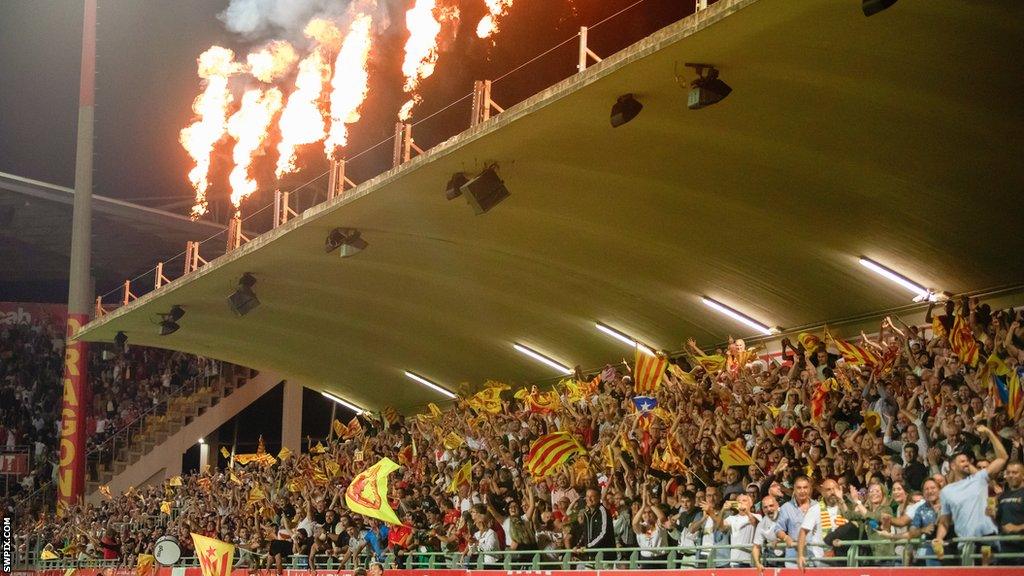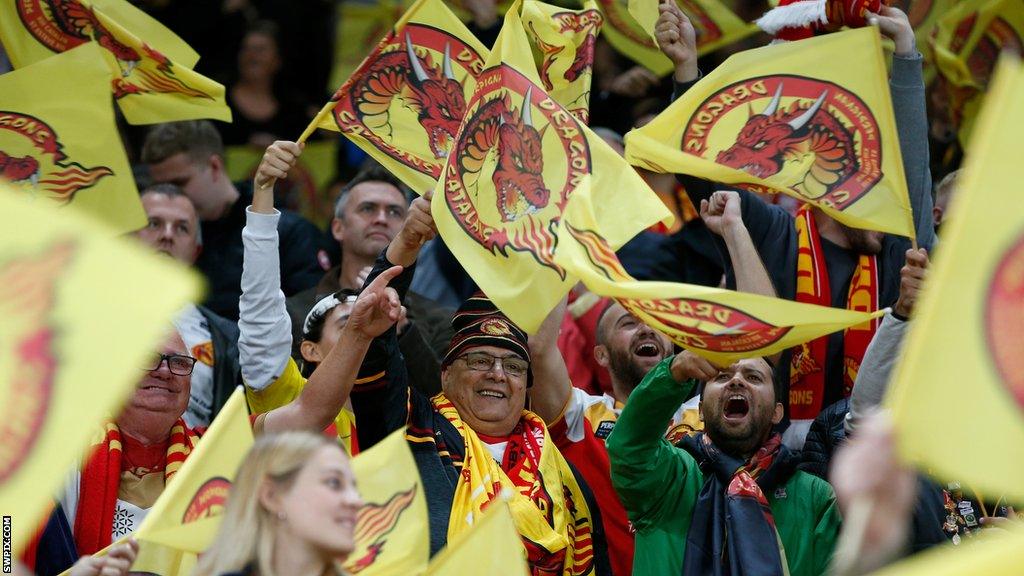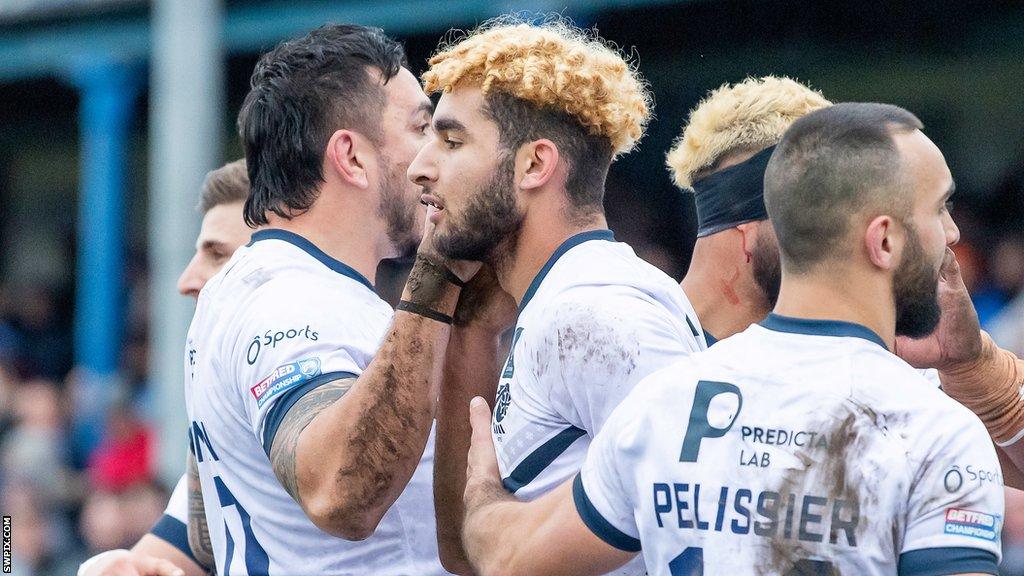Catalans Dragons, Toulouse and London Broncos give Super League's boundaries a potential seismic shift
- Published

Catalans showed they know the secret to the matchday experience with their hosting of the play-off semi against St Helens
Rugby league in the northern hemisphere could be set for a seismic geographical shift in this next week.
Catalans Dragons are aiming to become the first French champions of Super League when they take on Wigan in Saturday's Grand Final at Old Trafford, Manchester.
But just as significant is the promotion play-off game that takes place a day later when Toulouse entertain London Broncos in a play-off final for a place in next year's Super League. Nobody saw that coming.
There are still plenty of significant voices at several clubs who question the justification for Catalans' place at rugby league's top table.
The argument goes that they don't bring in any revenue - having failed to secure a lucrative French TV deal in their 17 years as part of the English game.
To some, their place in the top flight has done little to strengthen the French national team.
But, if that is a debate you want to enter into, you would have to ask how many English clubs have added to the competition's TV value in this past quarter of a century? How many have played a significant role in enhancing international rugby league?
Perpignan is a rugby league outpost, not an expansion city. Witness the scenes at the Stade Gilbert Brutus last weekend where a full house provided an electrifying atmosphere as the Dragons downed four-times champions St Helens.
And, this will be Catalans' second Grand Final - a second in three years. It makes their record better than every other English club, with the exception of St Helens, Wigan, Leeds, Bradford and Warrington.
They are one of only nine clubs to have appeared in a Grand Final in its 26-year history.

The logistical challenges for supporters will not stop some Catalans fans from making the trip to Old Trafford, as they did in 2021
Add their Challenge Cup Final win in 2018, and a lot of clubs in the so-called heartlands can only dream of that kind of success.
There will be fewer fans in Old Trafford for this year's Grand Final, given the difficulty of getting a few thousand French folk across to Manchester with only a week's notice.
But, having a legitimate European angle to rugby league's top flight must surely be a positive for IMG, the company charged with broadening the game's appeal, once they begin their marketing blitz.
Familiar faces could return and maintain spread
Which brings us to the Championship promotion play-off final, which takes place more than 700 miles south of Manchester, in Toulouse, a day later.
For most of the season it was presumed that Featherstone Rovers would be the side coming up, to replace relegated near-neighbours Wakefield, having topped the table by a distance for most of the campaign.

Toulouse have coped with the travel requirements of playing hundreds of miles away from their rivals and could return to Super League in 2024
It would be one club with a WF postcode, replacing another.
Toulouse were tipped as possible rivals. But London? No, not a chance.
The Broncos have bucked expectations. Under coach Mike Eccles, they have risen from obscurity to take the play-offs by storm, culminating in a breath-taking semi-final win at Featherstone that stunned the rugby league world.
Their success is also a welcome tonic for professional rugby league in the capital, given their neighbours London Skolars opted to withdraw from League One for 2024, external in a bid to "seek investment, consolidate and rebuild" as an amateur club.
Now Toulouse v London offers a double positive for those who would like to see the game attract attention from outside its perceived boundaries.
Both have been in Super League before. Toulouse had a year in the competition in 2022. London came up for the 2019 season, and were relegated on points difference only, having amassed 20 points, enough to have comfortably avoided the drop in most other years.
What is different this time is that whoever comes up will not be automatically relegated at the end of next season.
The new criteria, suggested by IMG after a game-wide consultation, means off-field factors, including geography, stadium facilities, potential fan base and engagement will be taken into account before deciding the composition of Super League in 2025 and beyond.
There are some major parts of those criteria in which both London and Toulouse could score well.

London's form in 2023 has been magnificent, under Mike Eccles, as they are now 80 minutes from a Super League return
So the fact they will almost certainly not be competition-ready for Super League next year does not matter so much. They will not panic and they know there is a potential to plan for the longer term.
Having a successful team in the capital was highlighted as vital by IMG in their assessment of what rugby league needed to grow its profile.
But having two French teams playing in the same competition, and this time with the potential of a little more stability and longevity in that situation, will give French administrators the basis to sell more lucrative rights to their own TV broadcasters.
Rugby league has struggled this year. The new TV deal announced a few weeks ago has seen the game's income shrink considerably in real terms. Centrally organised events - international matches and cup finals - have delivered losses.
But the last two games of the men's domestic campaign could turn pessimism in the present into optimism for the future.
